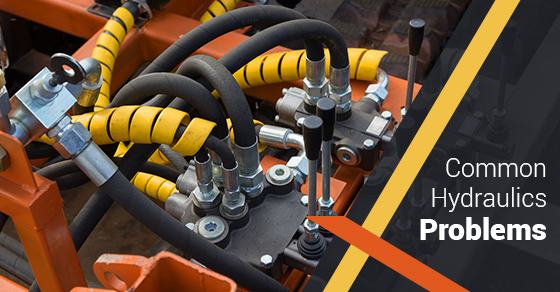Maintaining your hydraulic equipment is an important part of using it. However, you may encounter issues if you don’t follow proper instructions. Here and five common hydraulics problems and how to fix them:
- Unnecessary oil changes and using the wrong type of oilYou should only change the oil in your hydraulic equipment on two occasions: abasement of the base oil or decrease of the additive package. To determine if you need to perform an oil change you’ll need to do an oil analysis. Do not overdo it with the oil changes and you’ll save money and prolong the life of your machine. Additionally, you need to ensure you’re using the right kind of oil. Make sure the viscosity of the oil you’re using is not too high for the climate in which you’re operating the machine. Using the wrong viscosity can lead to lubrication damage, leakage, plus it eats up the system’s power.
- Changing the filters too oftenAs with oil, the filters need to be changed, but you can’t just do it whenever you feel like it. If you change your filters too early, you’re basically wasting money since the dirt-holding volume limit hasn’t been reached. If you change the filters too late the oil gets filled with particles and dirt that will slow the machine down. You should only change the filters when the dirt-holding capacity is maxed out but before the bypass valve opens; that way, you’re also monitoring pressure drops across the filter. There are devices available that detect clogs in the filters to help you know when a filter change is needed.
- Overworking the engineWhen the hydraulic system gets too hot, you need to stop using the equipment. Every system is different. So, in order to avoid overworking the engine, you’ll need to rely on the viscosity index of the oil. This is the rate of change in viscosity with temperature. When the oil heats up, its viscosity decreases and falls under what it required to stay lubricated and the engine of the hydraulic machine becomes overworked.
- Waiting for the equipment to prime itselfLubrication is key when running hydraulic equipment, but it’s not going to prime itself. Ensure that your machine is adequately lubricated before running it. If you don’t, you run the risk of damaging the entire system and you’ll hear some very unfortunate noises.
- Not learning how to properly use the equipmentGet the proper training for the hydraulic equipment, otherwise you run the risk of coming into the aforementioned problems. Learning everything there is to know about your equipment, how it works and how to maintain it, will help you avoid running into problems as you go about your work day.
Remember that with any hydraulic equipment, safety should always come first. If you encounter a problem that you’re unsure how to fix, contact the manufacturer for further instructions to avoid injury to you and your employees.


